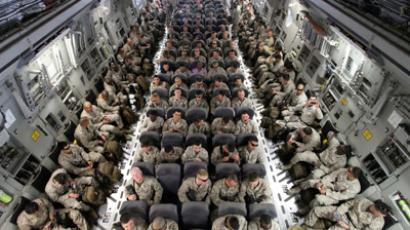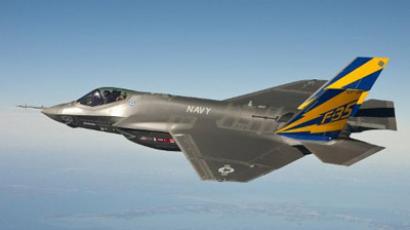Obama-style War on Terror: ‘Lofty statements’ amid ‘occupation crisis?’
Shortly after Barack Obama’s visit to Afghanistan on the anniversary of Bin Laden’s assassination, the Taliban has staged several bombings in Kabul. This is despite the US president’s claims that a victory over terror is "within reach."
Exactly a year ago Obama said the US had finally delivered justice on one of the world’s most notorious individuals. By now, nobody doubts that Bin Laden’s killing is going to be the highlight of Obama’s presidential campaign. It has already featured in his ads.“He took the harder and the more honorable path, and the one that produced in my opinion the best result,” former President Bill Clinton says in one of Obama’s ads, followed by the caption “Which path Mitt Romney would have taken?”As hyped as Bin Laden’s killing is, some ask whether it is being used to mask the failure of US policies abroad during the last 10 years. “The Bin Laden thing makes it easier, it sells well,” says Anthony Shaffer from the Center for Advanced Defense Studies. “But again I don’t think you can put that good a face on 10 years of combat in Afghanistan. And the Afghan and the Iraq invasion, I think there are too many questions still yet to be asked about what the justification of that was. No matter how much Bin Laden’s killing means, you can’t take away 10 years of failure.”“It was going into Afghanistan and especially Iraq that created more enemies and recruits for jihadist kind of Salafists than weakening them,” says Sterling Jensen from the National Defense University. The Pentagon's war strategy is slowly shifting away from traditional ground wars to targeted assassinations in different countries, with the use of drones and special ops.The Obama administration is considering a 10-15 per cent reduction in the US Army and Marine Corps in order to meet $489 billion budget cut over the next 10 years. On 5 January 2012 President Obama and the DoD released a defense guidance titled “Sustaining US Global Leadership: Priorities for 21st-century Defense,” outlining the strategy.Bin Laden’s killing has become the face of the new War on Terror – Obama-style.Experts say that policy could also backfire. The attacks end up killing many civilians, and they stir a new wave of revenge extremism.“How many people are we going to have to kill before we can finally say ‘OK, objective achieved. War over, we can call this thing off’?” asks Professor Andrew Bacevich from the Boston University. “I look at the Israeli experience with targeted assassination and that suggest me that when you engage in that kind of a policy really what you are going to do is having an endless list of targets. And I fear that is the path that we have gone down.”Bin Laden’s death was a success on the War on Terror front, no doubt about that – but there is an attempt to sell it as the success story for the whole War on Terror. The US president's visit to Kabul came one year after the killing of Osama Bin Laden by American Navy SEALs. Bombs and gunfire struck the Afghan capital Kabul shortly after Obama’s visit. The Taliban claimed responsibility and said the attacks were in retaliation for the US president's presence in the country.But in his speech at Bagram Airbase, Obama said that Washington is holding direct talks with the Taliban and said many in the terrorist group are interested in peace.Political analyst and Professor Sreeram Chaulia told RT that Obama is using such “lofty statements” about Bin Laden and war on terror because the US is facing an “occupation crisis” and they need to build a domestic consensus in favor of prolonging the war.RT: Just before these attacks, President Obama said the Taliban's momentum was broken and Washington was in direct negotiations with the group. What do you think is really going on? Sreeram Chaulia: I think the United States is facing a huge occupation crisis. They still have two years to serve war before the withdrawal begins. And now they have strategy to another 10 more years of technical advice and military presence, and possibly bases. I think they are facing an occupation crisis and they will need to build domestic consensus in favor of prolonging the war and that is why they are using these rhetorical, highly lofty statements about Bin laden. I think the Taliban know very well they are playing the waiting game and I don’t see them being defeated at all. In fact, rather for them victory lies in outlasting the United States. And even if it’s 10 more years I think it is actually, you know, like red [rag] to the bull, because as long as the Western military forces present, this insurrection and armed resistance will keep going. So I think that you can say that the United States has been defeated in Afghanistan.RT: Obama is saying that the defeat of Al-Qaeda is “within reach.” Is that hot air, because there are many analysts who say Al-Qaeda really is no longer in Afghanistan, it is in Pakistan?SC: No, absolutely. It has shifted eastwards and I’ve been arguing the same. I think you have several franchises and branches of Al-Qaeda that are still quite potent. And I think it is totally misguided to believe that the organization has been eliminated or annihilated. Rather what we are seeing is that its geographical locus is shifting eastwards towards Pakistan and even further towards eastern parts of Asia. And what we are going to see then is, you know, the United States will call it a day – eventually because of the economic crisis at home, they won’t be able to sustain this. But there is a section within the establishment that wants to believe that they still can achieve victory. This is the mistake made during Johnson’s time in the Vietnam War and they have repeated it all over again. So it is a real tragedy because the fact on the ground is: go away from the urban centers and the highways, and it’s all Taliban land, every patch of it.RT: Bin Laden was killed on Pakistani territory, but Obama only visited Kabul. What does this tell us about the state of relations between Washington and Islamabad?SC: I think Obama has been courageous to the extent that he knew that the Abbottabad raid on Bin Laden’s compound would jeopardize whatever thin relations the US already had with Pakistan. And with the drone strikes being so unpopular in Pakistan, I think we are at the stage where it’s fair to say that the United States is de facto also at war with Pakistan. And they know that the war is unwinnable, because Pakistan has in many ways thrown spanners into the wheel of the United States’ plans in Afghanistan. So it is fair to argue now that it has been a strategic defeat for the Unites States in the so-called ASPAC theater has, you know, has really backfired. And in many ways they can save face and they can say ‘we are still winning and [the] Taliban want to negotiate.’ But the point is, [the] Taliban is on a stronger position right now and they are winning this war. And let us face it – many asymmetric wars in the past had been won by the smaller sides. The United States is on the receiving side this time.














